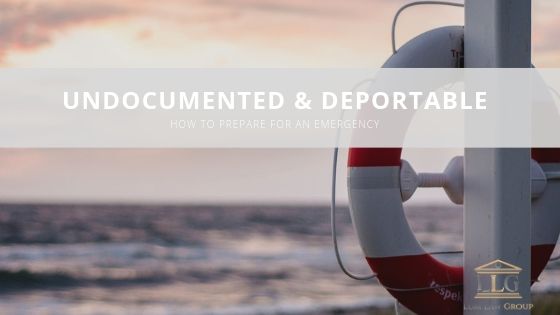Undocumented and Deportable: How to Prepare
Amid recent news on an increase in Immigration & Citizenship Enforcement (ICE) raids, many may worry about detainment. While California is immigrant-friendly, it doesn’t mean law enforcement won’t turn you over to ICE. It also does not prevent federal agents from taking you into custody. If you’re undocumented and worry you might be detained or deported, then this article is for you.
We’ve already written about how employer’s can guard against on-site job raids. We’ve also referenced many resources for undocumented immigrants to learn about their rights. You can always call us if you you have questions about your options or current immigration case. And we’ve discussed deportation and even waivers for inadmissibility. Now it’s time to talk go over precautions you can take to protect your family if you are at risk of deportation.
1. Memorize a phone number that’s not your own
We can all (hopefully) remember our own phone number, but do you remember the number of your emergency contact? How about your immigration attorney?
…Our number is 626-795-8886, by the way.
Be sure to remember at least one phone number of a reliable person whom you can call if you’re detained. This phone number should belong to someone who is available or who at least has a voicemail set up with an inbox that is not full.
2. Assign your kids a guardian
If you have children, and this is especially true if they’re U.S. citizens or lawful residents, they will need a guardian when you’re detained. Someone should know to pick up your kids from school, to take them home, or to stay in your home to care for them.
Someone should also be assigned to be legally responsible for them. Relatives can be informal guardians, but anyone can be given Informal Guardianship Authorization. This form would allow the guardian to enroll your kids in school, take them to the doctor, sign up for Medi-Cal, and other necessary items. Ask us about the form, or ask your school and medical professional what forms they offer. Prepare the necessary paperwork and sign multiple copies so that everyone has one.
3. Give someone trusted access to your info
Does your spouse, mother, child, or other emergency contact have access to your home? Do they have a key to your house? Your car? Do they know where their legal documents are? Do they know who your attorney is?
Be sure to organize all your immigration documents, forms, and other supporting documents in an accessible place. If you have criminal records, legal documents from your home country, tax records, or any other important documents, place them in the same space. Include any other “positive” documents about your American life, your family and children that may help your immigration case. Ensure your emergency contact knows where your legal documents are stored.
4. Prepare your loved ones
If you have an alien registration number (A#), be sure to share that with your friends and loved ones. If you are detained and they need to find you, they need certain information about you. Specifically, your full legal name (or names, if you have multiple), date of birth, and alien registration number. Share the Online Detainee Locator link with your loved ones.
Preparedness is important as it reduces stress for both you and your loved ones when you’re detained.
5. Know your rights
As an undocumented immigrant, you still have rights.
You have the right to silence. You have the right to tell the officer you do not wish to speak.
You have the right to speak to an attorney.
You have the right to privacy of your home and vehicle. You have the right to exit your home and meet officers outside (rather than let them in). You have the right to inspect a warrant to verify if an immigration signed it.
Don’t be afraid to ask for your rights!

